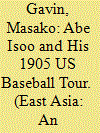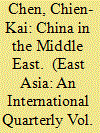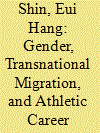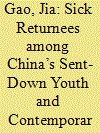|
|
|
Sort Order |
|
|
|
Items / Page
|
|
|
|
|
|
|
| Srl | Item |
| 1 |
ID:
180008


|
|
|
|
|
| Summary/Abstract |
On 4 April 1905, during the Russo-Japanese War, Abe Isoo (1865–1949), the father of baseball in Japan, Christian intellectual, and professor of economics and political science at Waseda University, took his baseball players to the USA to play against American students and local players in California. Amidst the war and growing anti-Japanese sentiment in California, Abe realized his decade-long dream of participating in international athletic competitions in anticipation of such games contributing to the resolution of international conflicts without weapons. His two primary goals were that his students would experience “systematic scientific” baseball on its home soil and that they would broaden their international perspective. The tour marked the first school excursion sent from Japan for an overseas sporting event and also initiated Japan into the arena of international sporting competitions. This paper focuses on Abe’s view of physical education as seen in his 1905 US tour (4 April–29 June 1905).
|
|
|
|
|
|
|
|
|
|
|
|
|
|
|
|
| 2 |
ID:
180005


|
|
|
|
|
| Summary/Abstract |
There is an ongoing debate about whether China’s growing economic presence in the Middle East will eventually make it more politically assertive on the Middle Eastern affairs. This paper demonstrates, from a theoretical perspective of “path dependence,” that China’s promotion of the “Five Principles of Peaceful Coexistence” since the 1950s as the guiding doctrine of its foreign relations has forged a “path” for China to follow, along which it has made and repeated promises against interventionism and imperialism to other countries including the Middle Eastern ones. It, in turn, has created a situation where moving away from that “path against interventionism and imperialism” will cause huge damage to China’s reputation as a reliable non-interventionist partner to the Middle Eastern countries, and the “Global South” in general. As a result, China has refrained, and will arguably continue to refrain, from being too politically assertive on the Middle Eastern affairs.
|
|
|
|
|
|
|
|
|
|
|
|
|
|
|
|
| 3 |
ID:
178166


|
|
|
|
|
| Summary/Abstract |
The heavy-metal pollution of the consumer-electronics industry has been a serious environmental problem in China. Since 2010, Chinese ENGOs have taken a few measures to address this challenge. Under the influence of other stakeholders, Chinese ENGOs have only played a limited role. To further explore the potential of domestic ENGOs, it would be necessary to understand how they have approached the heavy-metal challenge and why their contribution has been moderate. By using the method of “process tracing,” this paper presents a preliminary attempt to trace and generate localized knowledge of Chinese ENGOs’ approach and the influence of other stakeholders. Specifically, this paper divides the actions of Chinese ENGOs into the following three phases: initial participation, progressive involvement of MNCs, and collaborative tracking and online disclosure. Then, it traces the participation of Chinese mass media, domestic suppliers, local governments, and communities. It argues that the following six constraining factors have contributed to shaping the limited role of those Chinese ENGOs: (1) the complexity of the consumer-electronics supplier network; (2) Chinese ENGOs’ lack of leverage on MNCs; (3) Chinese ENGOs’ shortage of financial and human resources under a broad agenda; (4) domestic mass media’s lack of long-term interest; (5) reluctant participation of Chinese suppliers and local governments; and (6) conflicting interests within local communities. Three policy options for further exploring the potential of Chinese ENGOs are discussed, including financial and technical support, further engagement of international ENGOs, and supportive policy-making and interregional coordination by local governments.
|
|
|
|
|
|
|
|
|
|
|
|
|
|
|
|
| 4 |
ID:
180009


|
|
|
|
|
| Summary/Abstract |
Ku Ok-hee became the first ever Korean female golfer to win a tournament on the LPGA of Japan Tour (JLPGA Tour) by her victory in the Kibun Ladies Classic on March 31, 1985. Since then, Korean players as a group have amassed 228 victories on the JLPGA Tour by the end of the 2019 season. Although this has been a truly remarkable accomplishment in the history of international sports, no systematic investigation has been conducted thus far about the factors that contributed to the success of Korean women players on the JLPGA Tour. The primary purpose of this study is to analyze the rise and fall of the Korean players on the JLPGA Tour from the perspective of their career life cycles. More specifically, this study will apply the career life cycle model to the career pathways of the players on the tour. Each individual player’s career history on the Korean LPGA Tour before the player’s transnational migration to the JLPGA Tour will be examined to ascertain whether or not the player’s pre-migration record is a reliable predictor of the post-migration performance on the JLPGA Tour. The number of tournament victories of each of the Korean players during the player’s entire career on the JLPGA Tour will be reviewed. The all-time history of each individual player’s money ranking on the tour will be investigated for both the active and the retired players. A cohort analysis method is used in investigating the tournament wins and money ranking history of the players by comparing the tournament win records and the all-time money rankings on the basis of the entry cohort to the JLPGA Tour.
|
|
|
|
|
|
|
|
|
|
|
|
|
|
|
|
| 5 |
ID:
180007


|
|
|
|
|
| Summary/Abstract |
China’s first cohort of the sent-down youth during the Cultural Revolution has since its early years attracted considerable research interest and been analysed from a few different viewpoints. However, the gradual retreat from executing the sent-down policy, especially bingtui (return to urban centres of origin because of medical reasons) as the then widely used tactic, and its long-term impact on people’s socio-political attitudes and behaviours have not been examined and evaluated adequately. This has resulted in a large discrepancy between the non-academic discourse of returning sent-down youth, including bingtui, and the academic literature on these aspects in both Chinese and English. As revealed by many non-academic publications, bingtui not only represented the emergence of a widespread popular resistance to the Maoist Cultural Revolution that involved mobilising those who were then sent to the countryside, but was also believed to be responsible for a surge in what has since become known as songli feng (a wave of gift-giving practice). Based on the information recorded in published personal memories of many sent-down youth and other published accounts, online and print, as well as the information collected from my own past observations and recent interviews, this article will go beyond both glowing and condemnatory documentations of the sent-down movement of the late 1960s and 1970s and seek to analyse how bingtui was started, how it was utilised by sent-down youth and their families and, importantly, how it had led more Chinese people to realise that certain aspects of their identity could be performed.
|
|
|
|
|
|
|
|
|
|
|
|
|
|
|
|
| 6 |
ID:
180006


|
|
|
|
|
| Summary/Abstract |
In this essay, an attempt is made to use Alexander Wendt’s structural hypothesis to test
the structures of Vietnam–China relations from the beginning up to the present. The
results show that Vietnam–China relations have undergone three cultures: Hobbesian
culture, Lockean culture, and Kantian culture. In 113 B.C, without any restraint, the
expansionist identity of China formed Vietnam–China Hobbesian culture and then
nourished it up to the late twelfth century. Then, the external restraints changed
Vietnam–China Hobbesian culture into the Lockean culture in 1164. There was an
alternation of Hobbesian and Lockean culture in the period of 1164–1885. The
transitions of these two cultures were created by external restraint and self-restraint.
In the period of 1885–1949, the foundations for the Kantian culture was laid. From
1950 to July 1978, Communist ideology helped the Kantian culture to dominate
Vietnam–China relations. Though, from 1968 self-interests created a shift from Kantian
culture to Lockean culture. Without self-restraint, the identities of Vietnam and China
changed the Kantian culture into the Lockean culture in late 1978, and this culture has
been dominating Vietnam–China relations up to the present.
|
|
|
|
|
|
|
|
|
|
|
|
|
|
|
|
|
|
|
|
|